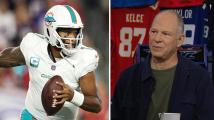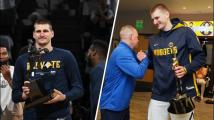Brian Ortega talks Alexander Volkanovski matchup, what's next if he wins title at UFC 260
Featherweight contender Brian Ortega gives champion Alexander Volkanovski credit for his many strengths, but believes he can get the job done when they faceoff at UFC 260 on March 27, 2021.
Video Transcript
KEVIN IOLE: Hey, folks. I am Kevin Iole. Welcome to Yahoo Sports. And my guest right now is one of the best fighters in the world, Brian Ortega, who will fight for the UFC featherweight championship at UFC 260. Brian, how are you, my man?
BRIAN ORTEGA: Been good, man. Just wrapping up the week, doing medias and getting ready for the big day.
KEVIN IOLE: Yeah, it's going to be a big day for you. How is having the experience of having fought for the title once before? You know what it's like. You know what fight week is like. You know the pressures that you feel on fight night. How do you think that helps you going into the fight with Alex Volkanovski?
BRIAN ORTEGA: I mean, experience is key. Knowing that you've been through that, and done that, experienced it even on a bad level. But you've experienced that type of pressure, that type of the lights, the camera, the action, the everything. I've walked through that road already. So knowing what to expect and knowing how it's going to be, it's good. It's experience.
KEVIN IOLE: I know when you talk, you changed coaches. After that, you came back with a nice win over the Korean Zombie. But putting the coaching situation aside, do you feel like you handled the championship fight the way you wanted? Or were there things that you could have done better going into the last fight in terms of handling the pressures and handling all the obligations that come with fighting for the title?
BRIAN ORTEGA: Put it this way. The way it all went down, and me being able to do what I did even on that level, it was what it was. There's always I could change this, I could change that. But I wouldn't. If I did change things, I probably would have-- it would have been a different outcome. And I would have never learned the lesson that I needed in life of it. So I am now surrounded by good people, good teammates, good coaches, good managers, a supportive team around me that's for me and my best interest. And I wouldn't have it any other way.
KEVIN IOLE: Awesome. The win over the zombie was not only a really impressive win, I wonder what it did for your psyche because when things change, you're used to winning coming off a loss, and then you have all these changes in your life. The fact that I know you were optimistic going into that fight and you talked about how good your team was, but the fact that then you produced and you were able to pull the victory out, how much mentally does that help you going into a championship fight now?
BRIAN ORTEGA: It's always good to have even-- it doesn't matter if it's a championship fight or not. To go in there after you win someone, you have the self confidence. The self is self belief. And you have true believe in your abilities with what you've been taught. Now that I've learned what I've learned, I'm learning what I'm learning, and doing everything that I'm doing, it's proof. The proof is in the pudding. I did my work. I fought the zombie. I outclassed a striker who is one of the scariest strikers in the UFC in the featherweight and beat them five rounds to none.
So to be able to do that for sure it gives you confidence.
KEVIN IOLE: When you look at Alex, he has the back to back wins over Max Holloway, certainly the last fight a little bit controversial in terms of who won the fight. A lot of people thought that Holloway might have edged that fight out. What is it that you think Volkanovski does well and that you have to kind of be prepared for.
BRIAN ORTEGA: He's a good competitor. He knows how to win rounds. He knows how to play the game, he knows how to play the system. He angles out well. He has good moments. He's a very disciplined fighter when it comes to staying in the fight and sticking to his game plan. And he's very good at that. He knows when to fight smart, when to fight hard. But mostly when to fight smart. And he knows how to get a job done and get a W regardless of the way he wins, which it's a good-- I give him credit for that.
KEVIN IOLE: His first win over Holloway was at UFC 245, maybe that was the beginning of the calf kick craze where he started throwing all those calf kicks in the fight. Do you expect him to use that technique on you at all? And if so, how have you done dealing with kicks like that?
BRIAN ORTEGA: I'm going to expect us to feel each other out, see what we're going to bring to the table. I feel like he's going to try everything and he's going to see what he can get away with and what he can't. And then based on that data, then he's going to figure out what to do with the next four rounds or proceed on with the round by round. It's without saying too much, but yeah.
KEVIN IOLE: Do you feel like from a mental standpoint, you have an advantage going into this fight? For this reason I say, you know the highest highs and the lowest lows. And he's a guy that's just been up there. And so sometimes when you don't reach bottom, you don't know kind of the things. And do you think in any way that it gives you an advantage, the fact that you've picked yourself up off the floor after a devastating loss and come back. Does that help in any way make it better for you?
BRIAN ORTEGA: It just lets me know that I'm able to do that, I'm able to take a loss and go and reassess my life and everything and my team, and really make the differences. But in terms of making you stronger, I mean, every time I go in there, I'm stronger. It takes a certain type of individual to go in there given the obstacles that you're giving to the training camps and how hard these things are, and to go out there and perform to the best of your abilities.
All of us are tough in here. Mental advantage or not. But I do feel I just got that in the back. Yeah. It does give me more relief just to know that I can lose it all and get it all back. But that's the type of human I've always been. So I've always known that.
KEVIN IOLE: Right. You've come up the hard way.
BRIAN ORTEGA: Yeah. I've always known that. So it's not like it's new to me. I feel like just people haven't seen that about me. And because I was always winning, I never lost. So you guys never had to see that.
KEVIN IOLE: Right.
BRIAN ORTEGA: So now that you guys did see that, you're like, oh, you have this ability. And it's like, I've known this.
KEVIN IOLE: Right.
BRIAN ORTEGA: But it's good that you guys now acknowledge it.
KEVIN IOLE: People love a comeback story, too. Right? I mean that's a thing that and you were such a hugely popular guy. I think a lot of fans really took to your game and the style that you fought and that big win you had over Frankie Edgar got you a lot of fans. And but they like a comeback story too. And I think if you're able to pull this off, if anybody jumped off the bandwagon, I think they'd be pretty quickly back on it. Don't you?
BRIAN ORTEGA: Yeah. I mean, that's what we base movies off of, situations like this. Some of the best movies are based off real life situations like that. I'm a real life person and a real life movie of what's going on in my life. So to have it unfold in front of me is beautiful.
KEVIN IOLE: I know the story. A lot of people know the story. But maybe some people don't that are listening to this. And can you just tell sort of how poor you were growing up and how difficult your life was as a kid? If you can just kind of condense it a little bit. But I know that people always love that rags to riches. That's the other kind of part of your story that's amazing, that you picked yourself up from literally from nothing and got to here where you were. But how tough was your life when you were a kid? And how is it different from, say, what we would consider the average person?
BRIAN ORTEGA: It's hard to say how tough my life was because my life was my life. I didn't know-- I had nothing to compare it to. It's hard to say, my life was this, when you don't have comparison. Anyone I know lived the same life I did. If anything, I thought I came up because we went from the Projects Section 8 to house, to an actual house. In my opinion, the way I grew up was like, man, I'm the rich one out of the group. The majority of my friends are still here in the projects and dealing with all this. I actually I live in a house now.
I mean, it's still surrounded by the same type of environment, but nevertheless, I have a house. I have a backyard where I don't have to share. I don't have to worry about someone coming in there and stealing this, or stealing that, or taking my ball from my backyard. So I felt like I was the rich one. When you don't know any better, you don't know. And it's later in life for me as I get older, as I grow, and as I have things to compare it to, and collect data from different types of lives that people have lived and are living, is where I start to analyze and say, you know what? It was different.
This was not right. Or this was harder. I did not have three nice square meals a day, a nice going, and two parents that were always there. So to understand that, I think it's more of just learning to forgive the past, learning to understand it, I know what it made me. And it's-- I mean it just it is what it is. You have your story, I have mine.
KEVIN IOLE: A couple other thing I want to ask you about that you reference some of the kids that you grew up with in the project. Do you stay in touch with any of them? And are you able to help them because they see what you've done and how you go? Have you been able to kind of help some of your friends? And what is that like?
BRIAN ORTEGA: At this point, we're all grown ups. Some of my friends are either, they're away for a while, or a long time, who are never coming back out. Some have already passed due to some unfortunate circumstances. And the ones who are out, they're doing their best to just stay afloat, or they found their niche in life. They found where to work, what to do. They're just they're living their life. So I'm not too much of an inspiration for them on how to better their life.
I'm more of a guy they cheer on from their neighborhood to say, bro, you're doing it. And you're inspiring the generations underneath us.
KEVIN IOLE: Coming up.
BRIAN ORTEGA: Forget us. We had our time and we did what we did. But for these up and coming kids, they're looking at you. You're the light of the harbor they call me. So that's what I'm trying to do is just keep that light for these kids that are growing up in these same neighborhoods and areas that I grew up in. Hopefully I can support as many as I can.
KEVIN IOLE: Let's wrap it up here. Dana White puts that belt around your waist at Apex, UFC 260. What will that mean to you? What will the significance of that moment be in your life? You worked a long time to get to the top. What will that mean if you're able to pull that off?
BRIAN ORTEGA: Mission accomplished. I set my mind to do something and I did it. Emotional value in terms of winning that fight, it happens at every fight. Every fight is a huge obstacle. For me, every fight is the most important fight of my life. Same one with this one. So to always overcome that, obviously you feel happiness, gratitude, just amazing that you get from this sport that we do.
But for me, it's more like, pat yourself on the back, champ. You did it. You said you were going to do it. You made it happen. Now you [BLEEPS] up because now you got to work harder than ever.
KEVIN IOLE: Yeah. you have that belt, who do you call out? The first thing, you're holding the belt in your hand, who do you say you want next?
BRIAN ORTEGA: I mean it's obvious. We have to fight Max Holloway. That's obvious.
KEVIN IOLE: You feel like because you lost to him that there's a little cloud over you until you beat him?
BRIAN ORTEGA: Absolutely. There's no way I would be able to 100% hold that belt and feel like the champ champ if I haven't fought him yet.
KEVIN IOLE: Right.
BRIAN ORTEGA: And styles make matches. And we're all different. We're stuck in this trio right now. And boxing has had it and the greatest of combat sports I've had this trio that we keep fighting each other. And we are the trio. You have Max, you have Volkanovski, and you have myself. I'm happy to be up in the [BLEEPS] mix.
KEVIN IOLE: I love it. It's fun. UFC 260. My guest, Brian Ortega, will be challenging Alex Volkanovski for the UFC featherweight championship. Brian, I appreciate you, my friend. All the best. See you next week.
BRIAN ORTEGA: See you.
KEVIN IOLE: Thanks, Brian.







